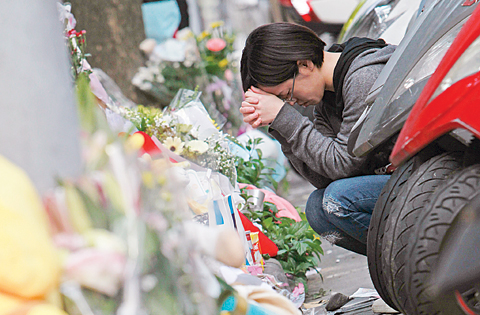 TAIPEI: A woman prays in front of a makeshift memorial offered with flowers and stuffed animals for a girl who was killed Monday by a knife-wielding assailant outside a subway station. —AP
TAIPEI: A woman prays in front of a makeshift memorial offered with flowers and stuffed animals for a girl who was killed Monday by a knife-wielding assailant outside a subway station. —APTAIPEI: The apparently random decapitation of a 3-year-old girl in front of her mother in low-crime Taipei this week has sparked outrage, calls to save the death penalty and questions about the island’s state of mental health care. The attack on the child, who was walking behind her mother on the way to a metro station, has stunned and horrified inhabitants of greater Taipei, with the reaction at times verging on violence.
Hours after the girl was killed, a crowd gathered outside the police station where the slaying suspect was taken, some of them armed with baseball bats. “I can’t accept this,” said Chiu Yuan-chao, Taipei mother of a 9-year-old, said in a telephone interview. “This kind of person shouldn’t be allowed to enjoy the treatment of a normal person. I think all moms and dads will have this kind of view. This sort of incident is becoming something of a trend and my feeling is that the society is amid some sort of panic.”
Police work
Police arrested Wang Ching-yu, 33, who they suspect killed the child. He had been was hospitalized for treatment in 2010 and 2014 after arguing with his family because of an unspecified mental illness, Central News Agency said, citing police. Authorities have not said whether mental illness was a factor in the attack or whether Wang had been clinically diagnosed with any mental illness. City dwellers largely still consider the metro area of 5.6 million to be safe.
Murders across the island have fallen from 1,765 cases in 1995 to 474 in 2014, statistics from the National Police Agency show. But the attack triggered debate about whether to keep the death penalty as a deterrent against violent crime. Legislators have been discussing reforms to the punishment, which had been effectively suspended from December 2005 to May 2008. Thirty-three people have been executed since 2008. —AP









